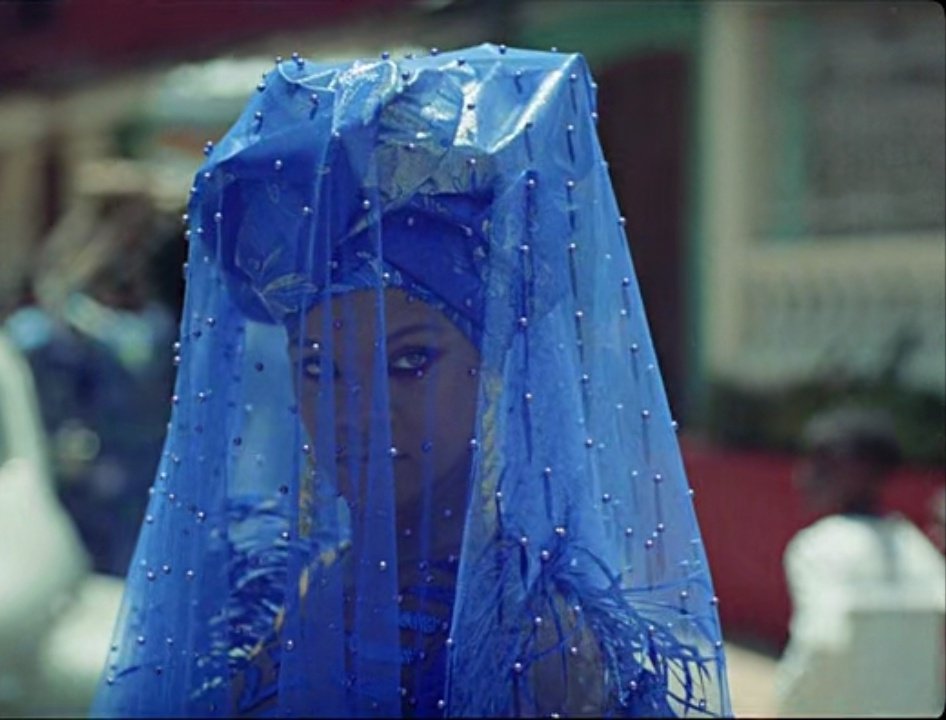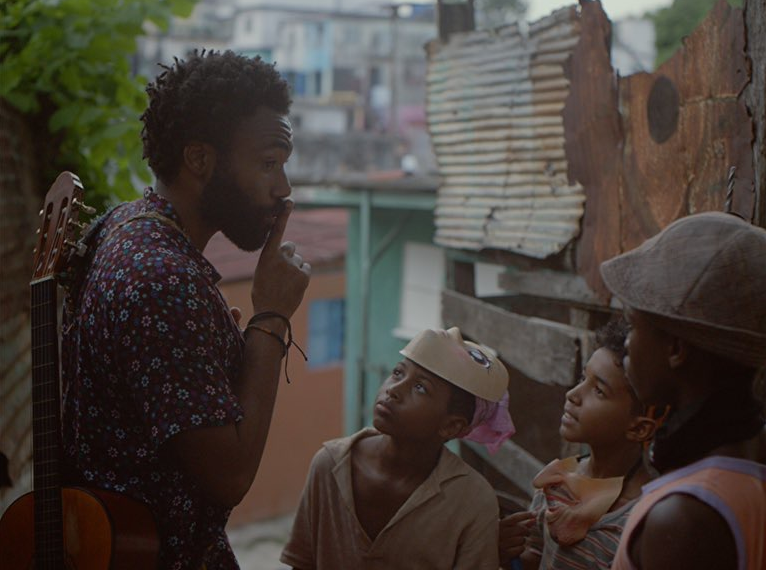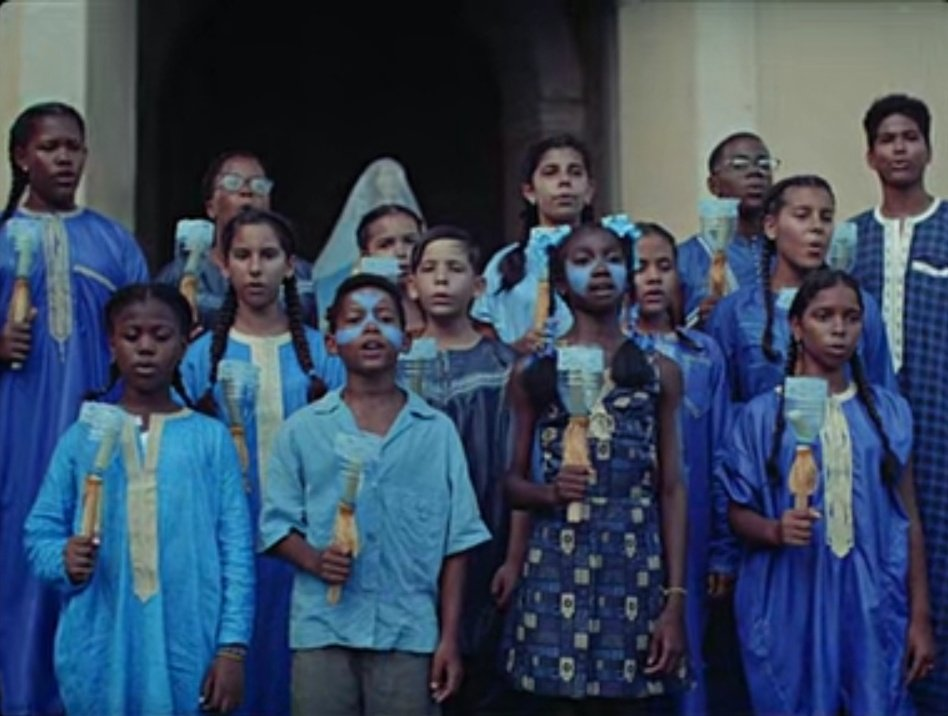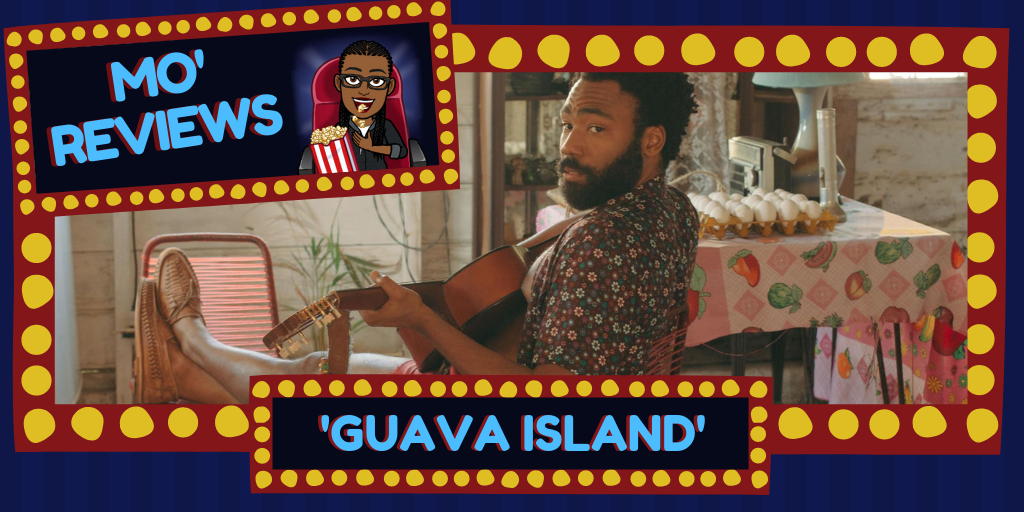Synopsis:
On Guava Island, a local musician is determined to throw a festival for everyone to enjoy. A tropical thriller starring Donald Glover and Rihanna.
Amazon Studios
Monique’s Review:
Slight spoilers
I honestly wasn’t sure what to think when I pressed play. There are some things about Donald Glover’s type of artistry that sometimes worries me, such as a type of indescribable vapid quality that can be felt through some of his work. Ringer’s Damage Control episode with K. Austin Collins and Justin Charity talks about this aspect of Glover’s career exclusively. In fact, Collins unleashes the most ire for Glover’s brand of art by saying how it seems he mimics what’s hot at the moment. Part of this might also have to do with Glover’s past brand of stardom, which was directly in that “special Black person” arena populated by Van Jones and other Black folks who think they are somehow beyond the norm just because they have white and Asian friends and love anime.
Guava Island, however, sticks out as yet another moment in Glover’s career in which he endeavors to place himself in the “Black and Proud” realm that is, speaking in terms of Hollywood, is all the rage these days. The film has all of the hallmarks of a successful Black media project tailor made for Twitter. It stars some of the biggest stars in Black Hollywood today, such as Rihanna, Letitia Wright and Nonso Anozie. It is set in Cuba and revolves solely around Afro-Latino and Caribbean culture. It features Childish Gambino’s music and Afrocentric dancing. It also even includes aspects of Afro-Latino spirituality, indicative in the prayer the woman tells Rihanna and Rihanna’s funereal wear in the final scenes.

I can honestly tell you that Guava Island is fun. It’s a cool way to spend an hour; it’s got sun, sand, and Rihanna. But it’s not as frothy as it’s been billed as–there is death, and the island itself is run under a dictatorship that exploits the island’s biggest export, the most beautiful blue silk on the planet.
The synopsis by itself stands as a cool premise for a film–someone tries to take on the system with the power of music. We’ve seen this play out before with Footloose, Sister Act, Blues Brothers, School of Rock and others. But where Guava Island‘s concerned, I have some questions.
As I watched the film, I wondered how ethical it is to tell a story about an island that’s an analogy of Cuba and film it in Cuba, but not be interested in Cuban politics and society. You might be like, “Why are you getting this deep with this film, Monique? It’s for Coachella, for goodness sake!” But just because it’s for Coachella, stars Rihanna (whose makeup I’ve bought and will continue to buy), and expounds upon the “Black Excellence” movement doesn’t mean it’s above critique. In fact, it’s because it’s a Black film reflecting Blackness that makes me, a Black reviewer, that much more nitpicky about it.
While we don’t want other reviewers to lump the Black diaspora under the same label, we also can’t lump each other under the same label as well. This is similar to what I discussed with Mira Jacob in our Good Talk interview. The M.O. to put Blackness or any type of ethnic otherness in the same realm is a defense mechanism that could only end up hurting our own ability to see ourselves as different facets of a multinational, multicultural, multiethnic and multiracial Black diaspora. In other words, what does “Black Excellence” mean in terms of film if that brand of excellence is defined in terms of Black Americanism?
Enough of a preamble, let’s get to the heart of my issue with Guava Island. It’s a film that uses Cuba and its people as an exotic backdrop. In this way, it’s no different than a white film in which whiteness is centered in a non-Anglo and/or non-white country. The drama, in Guava Island‘s case, is centered around a Black American idea of what it means to be a Black Caribbean and/or Afro-Latinx.
The film posits that being Black and Caribbean or Afro-Latinx is the same as being Black in America, something that is a mistake many Black Americans tend to make. For Black America, the islands are viewed as a mystical, magical place where Blackness can be free. But even the islands have shackles on Blackness. Take the Dominican Republic and Haiti, two countries constantly at odds because of anti-Black sentiment within the DR towards Haitian immigrants and Black DR residents. We in America view the islands as an escapade, but for those on the islands, life is not always a Twitter-fueled picnic.

There’s no true look at island life, and there’s no honest intention to investigate island life for Black people–the film doesn’t bill itself as that type of endeavor. However, it also seems to hover in the space of acting as an allegory; it’s too on the nose that Guava Island, a film about an island under a dictatorship, would be filmed on an island under a system that some have argued is a dictatorship (technically, Cuba describes itself as a people’s democracy).
With that kind of tongue-in-cheek-ness, the film must be trying to say something about the nation’s politics. One part in particular in the film wants us to think about it in comparison to America–the moment when Deni (Glover) launches into “This Is America,” mocking his co-worker at the docks for wanting to leave the island for America to make a new start for himself.
But if we’re to take Guava Island as a Cuba stand-in, is it Glover’s place as an American–especially one who doesn’t seem up on Cuban politics–to disparage someone’s view of how they can better themselves in another country? What is Glover trying to say about Cuba in relation to America that would make any sense to both Americans and Cubans with “This Is America,” a song exclusively about American society? The political views in Cuba are varied; not everyone supports the Communist government, while other folks still believe in the government for its liberation tactics regrading Black Cubans. Something as light as Guava Island can’t try to position itself as an allegory of any type when Glover isn’t interested in the questions he’s halfheartedly posing.
I already know some are going to say my supposition is faulty since Rihanna is from Barbados and Wright’s family is from Guyana, meaning that the film does have some legitimate Caribbean* influence. But even with them in the film, Guava Island asserts that whether you’re from the islands or America, Blackness is interchangeable.
Case in point: there is no standard accent for those on the island. This isn’t counting dialects or regional accents; what I’m saying is that there is no unifiying mother accent. This makes the film’s setting feels like it floats in a dreamscape. Some could say this is a unique thing; I say it’s something that hurts the film, since it gives the idea that there’s no use detailing what makes each accent meaningful. There’s no world-building because the film relies on fact that everyone is the same skin color. But that’s not all that’s important here; some care needs to be taken with how everyone is represented.
The best example of this is Glover’s “accent,” which drifts between his horrible accent he used for Lando Calrissian in Solo: A Star Wars Story, a jokey British accent, and his own regular non-accented speech. It’s confusing, it’s upsetting, and it’s unfortunate.

With all of this said, though, it’s not as if I hate the film. It’s fun and jaunty, particularly the opening animated sequence, and Glover takes on his Bugs Bunny-esque role with humor and earnestness. The rest of the cast bring light and fresh air with Wright and Anozie being standouts, even though they don’t have a lot to do and Anozie is playing a ruthless villain. Hiro Murai once again uses his expert lens to give us an aesthetically pleasing film. But with all of that fun, I am left asking what the film’s purpose is.
You could say that it’s a film of the times, asking us to find joy in being alive and being together, a power that can save us even when times seem dark. In fact, Deni’s death acts as a catalyst toward the island remembering who and what it is, leading to a transformation that allows, as Rihanna’s character Kofi tells her child, for dreams to come true. On that aspect, Guava Island is a salvo for increasingly turbulent times.
However, there is something about Guava Island that seems just a little too polished and too vague at the same time. It’s also too generic regarding the Black experience, something that only becomes part of my critique because of how much it thinks it’s saying about the Black experience.
Shadow and Act’s Malik Adán hit the nail on the head with his review. “Where Atlanta provided a glimpse of an artist committing singularly to an idea, Guava Island is a phantasmagorical collection of art school necessities–bright colors, animation, celebrity cameos, non-professional actors, chiaroscuro, absurdity and surreality, vague nostalgia, and ‘if this, then that’ cultural critique. Altogether, they create a dazzling carapace. But when you drum on the shell, there’s a hollowness throughout.”
Maybe Glover is still searching for his identity within his Blackness. If he could find himself instead of pretending to be this savant of Black culture, a culture he was just eschewing a few years ago, that would be great.
*Guyana is considered part of the Caribbean even though it is in South America
